#...confession: I always saw Warren as pretty straight but his fans could probably give some good examples
Explore tagged Tumblr posts
Text
It really is interesting to read this issue after the fact.
One thing that I always thought could give future fans/creators ammunition is Jean's reaction to Bobby suggesting he's bi. She says something like "they say everybody is."
Then, she fairly gently (for her) says that she's pretty sure he's "full gay".
The only reason she brings up Bobby's sexuality at all is, as you've said, a reaction to his objectification of Magik.
It's interesting then, to think about how things would have happened during the adolescence they remember - the 1960s comic. (Or whatever decade we update it to now, thank you rolling timeline).
The X-Men were brought to the future during the events of Uncanny X-Men #8. They're all still relatively new to each other. There's been enough time that they've settled as battle comrades. Scott and Jean have already had a few of their angsty thought bubble monologues. But her telepathy won't be active for quite a long time. At least a year or two, even taking the rolling timeline into account.
IIRC, we learn about her telepathy after Xavier's first "death". When it's revealed that he was faking it, and made Jean take part. So even though Bobby was acting like an idiot with Alex and Lorna (...actually, that is a storyline that would be really interesting to examine with modern eyes), I can see why she wouldn't have brought it up.
But I still think the "they say everybody is" is a potentially interesting response. It COULD be a neutral denial. But it also could be a "yeah, but the others aren't acting like a cartoon wolf right now." (Though they certainly did in Uncanny X-Men #1, as I recall. Heh.)
And as to who "the others" could be...that has interesting potential.
Teen Jean outs Bobby Drake pt 1
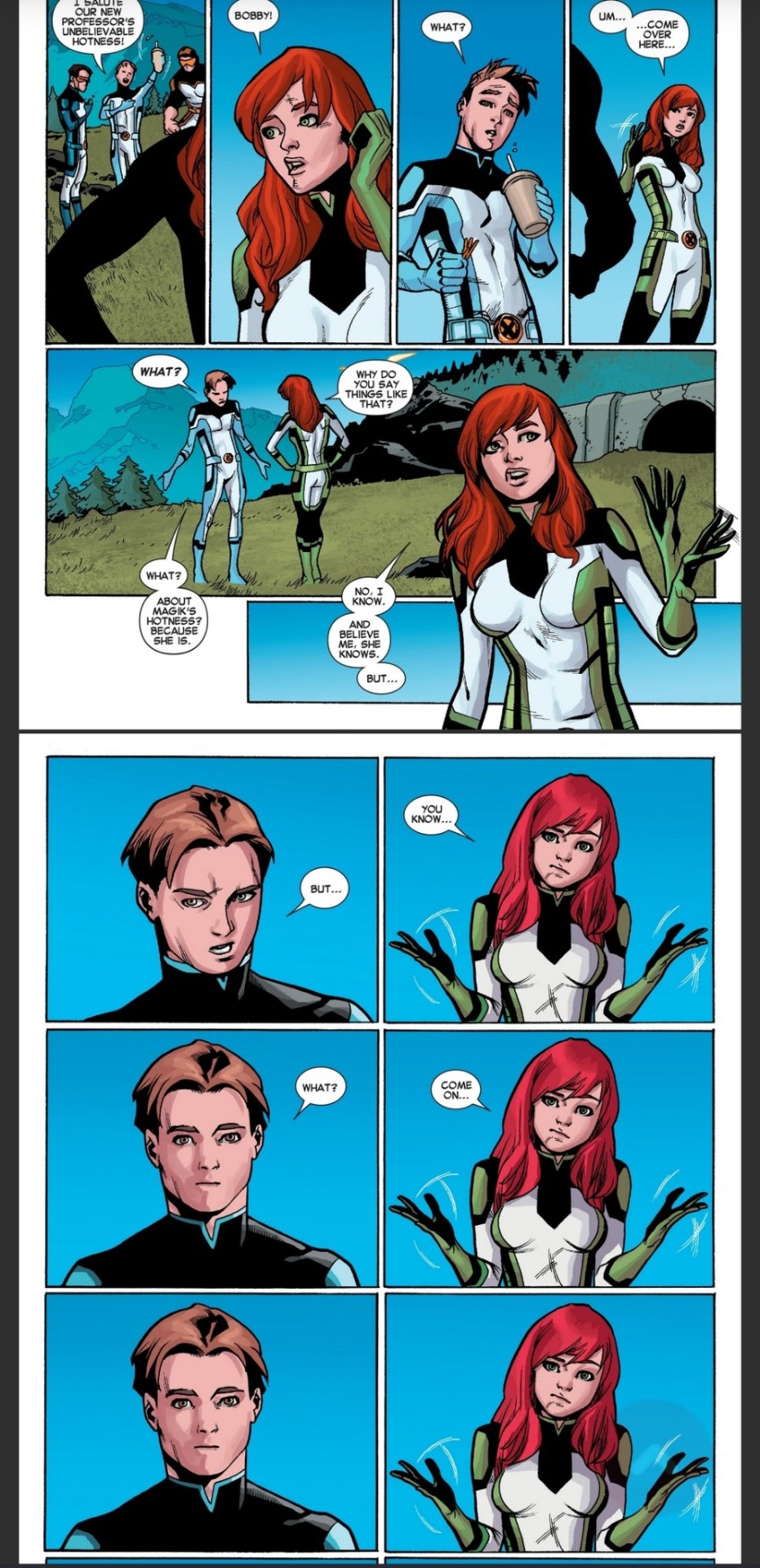
So... Marvel finally decided to confirm that Bobby Drake is gay in All-New X-Men vol 1. I'd forgotten it was a response of sorts to Bobby aggressively performing heterosexuality by objectifying Magik. Not that it makes Jean's behaviour any kind of model for being an ally, but it's easier to see how she arrived at this conversation. It wasn't just out of the blue.
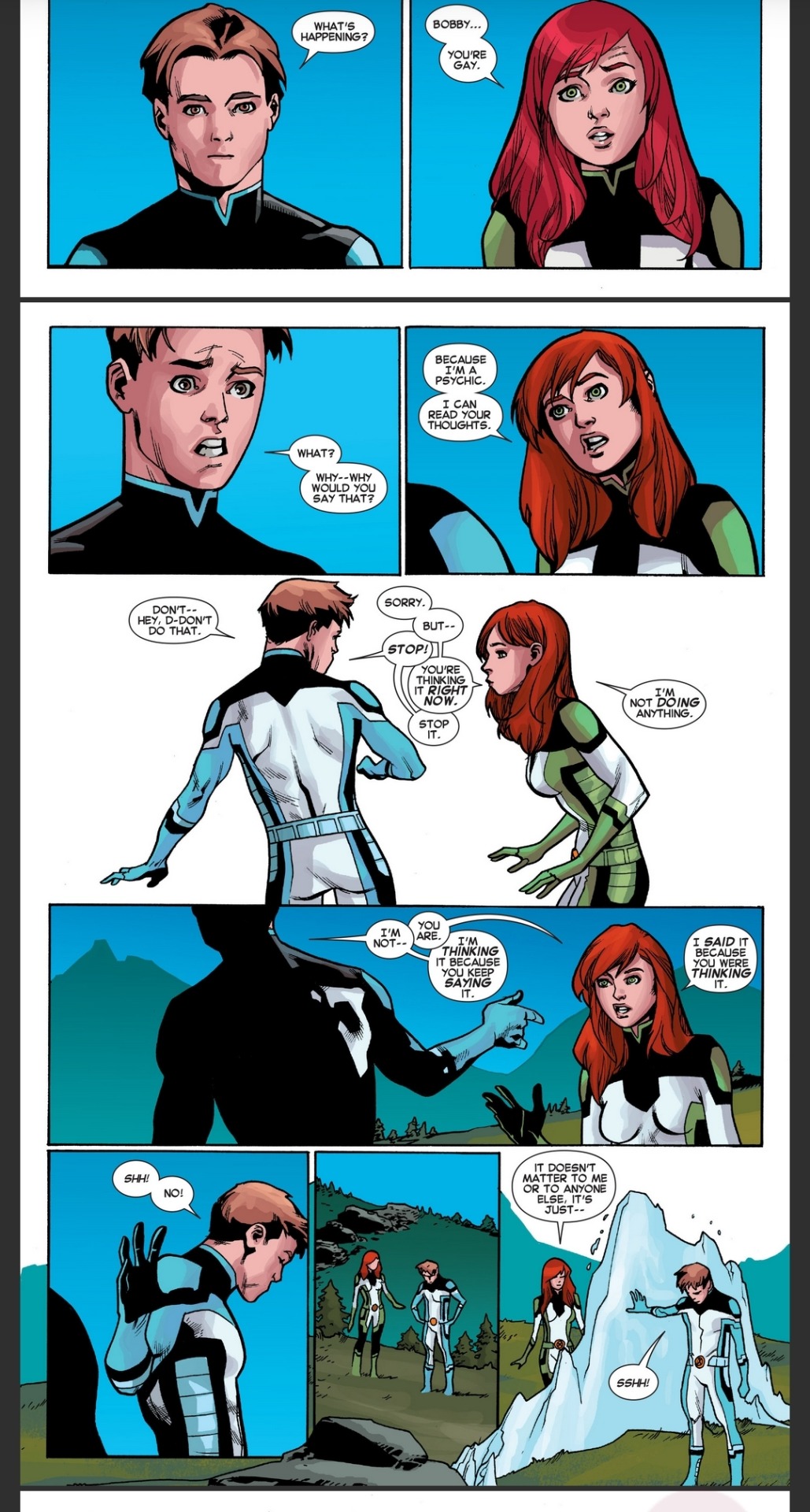
It's clear he absolutely knows he's gay, but he's been closeted for years and I think his persona was built for self protection. A person's openness with their sexuality is entirely up to them (thank fuck telepaths aren't real) and the O5 had grown up in the 60s then suddenly were taken to 2014. Homophobia is still absolutely rampant, but the difference must have been stark. Bobby's parents are also super conservative assholes - given their attitude to him being a mutant he knows they would be awful if he came out to them. Xavier isn't exactly progressive either.
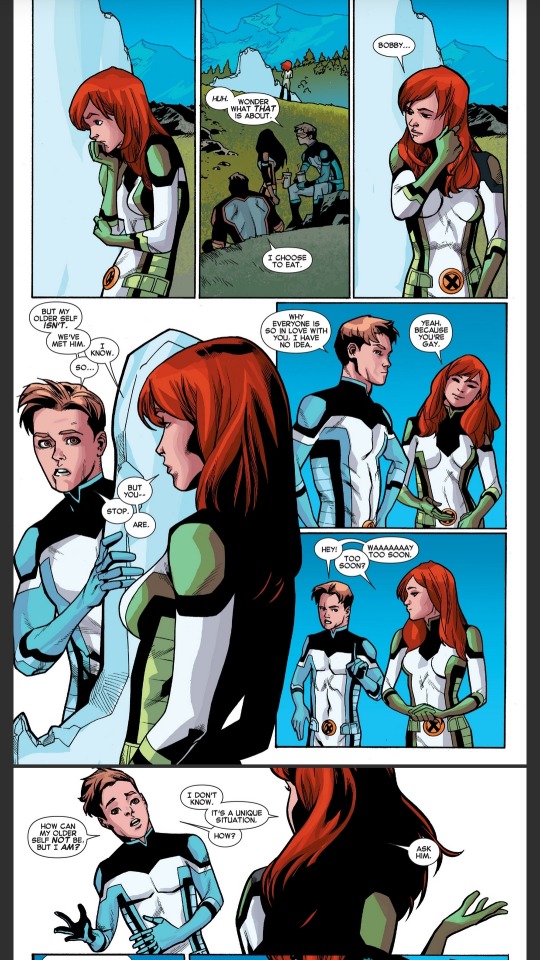
The ice barrier he puts up is him shutting the conversation down while holding back. I'd probably freeze her solid and flee. Interestingly he stops denying it very quickly (not like he had a fucking choice, JEAN) and brings up the headfuck that is his older self who 'isn't [gay.] It really is a unique situation.
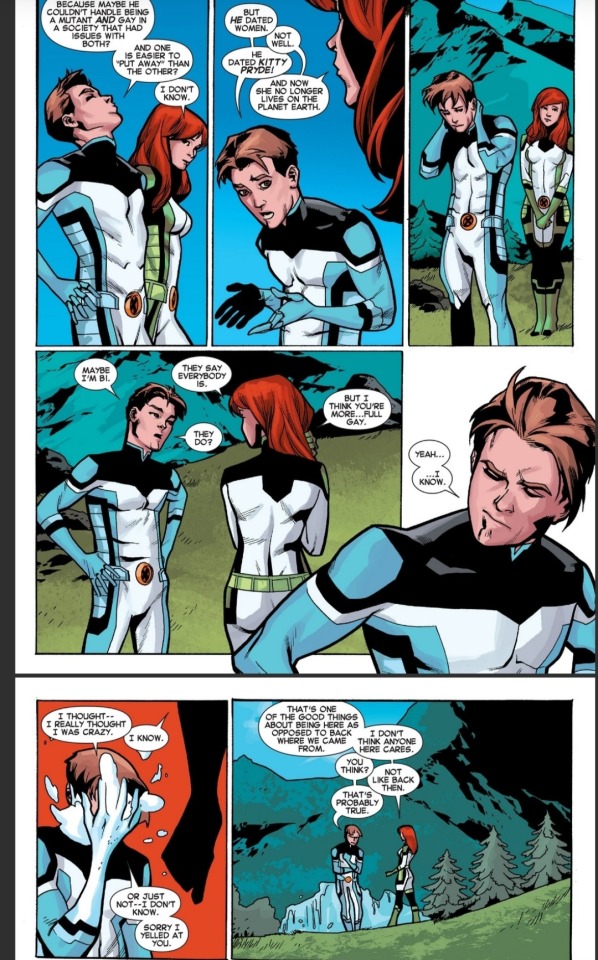
I get the impression that Bobby's 'speculation' is spot on, it's obviously the same thought process he had. It's incredibly articulate and thoughtful, which should give an idea of just how much of a performance he has been putting on. Plenty of gay and queer folks date people you wouldn't 'expect' them to. Experimentation is how we figure ourselves out, and heteronormativity is a hell of a drug.
He accepts it pretty quickly, and they briefly discuss the cultural differences compared to their own time.
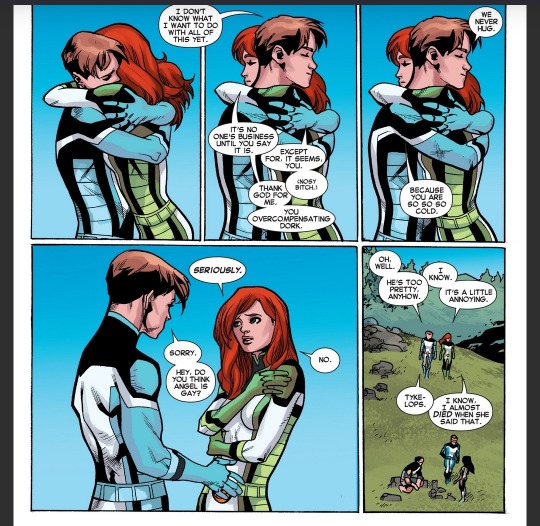
He accepts it super quickly and allows himself to think out loud about people he finds attractive. Warren, mainly. I don't believe him for a second that Warren is 'too pretty' as I'll discuss in part 2, but I have to say I misremembered the privacy aspect of this. Obviously Jean went to Charles Xavier school of psychic consent (literally) but she at least talks to him privately about this, and assures him 'it's no one's business until you say it is.'
She didn't so much out him as drag him kicking and screaming out of the closet, but she kept it between them and stuck to that. That, at least, is a positive model for supporting queer friends. There's a lot of trust there, and Jean outing Bobby isn't as bad as I remember it. Bobby certainly seems a LOT happier afterwards and while his exploration of his sexuality/dating is awkward as hell, that's true for everyone. I wonder if he's grateful to Jean for this. It feels weird to say it but he probably is. The flipside of telepathy existing is the misery someone who wasn't his friend could have inflicted. There's Xavier, too, who surely must have known, right? He doesn't know the meaning of privacy - what should he have done with this information? We know what he did in canon - nothing. It's such an odd situation that it's hard to judge but if someone in your care is closeted for decades then maybe you didn't provide the best environment.
Thus, the ice twink was born. Next time, Teen Jean and Teen Bobby talk to the Bobby of this time period. That's going to be awkward to write about. Ultimately, it does portray common queer experiences (albeit with telepathy and time travel involved) and emphatically normalises not being straight. It's not perfect, and it wasn't very groundbreaking for 2014, but it's something.
#jean grey#bobby drake#original five#I mean Scott - in light of the throuple could easily have other angsty monologues we don't see#And honestly Hank's attitude after his split with Scott had a lot of angry ex vibes - and Brand is downright Summersian in her own right#...confession: I always saw Warren as pretty straight but his fans could probably give some good examples#And of course there's Xavier and Magneto...#Hashtag MaxDeservesBetter
48 notes
·
View notes
Text
Truly Devious
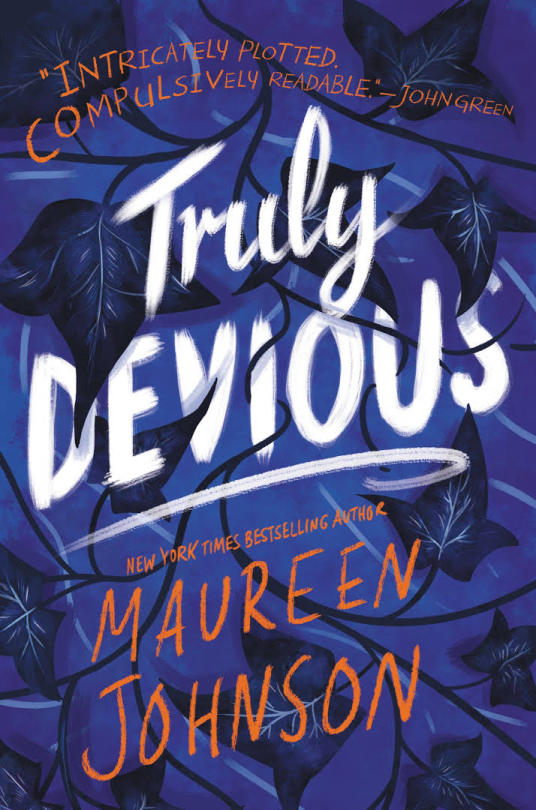
Truly Devious is the first book in a YA mystery/thriller series written by Maureen Johnson. It follows Steve, a high school junior, who gets accepted to Ellingham Academy, a free private high school founded by Mr Ellingham: a newspaper and steel magnate, who viewed learning as a form of play. She gets admitted to the school because of her peculiar interest in true crime and investigations, specifically because she wants to solve the famous Ellingham mystery: who kidnapped and killed his family. This book got rave reviews; people said it was atmospheric, creepy, clever and I went into it with high expectations, but also a lot of skepticism, mostly because me and YA thrillers don’t tend to always agree.
I can happily say that this book delivers on most of the hype. It’s well written, both the case in the past and the case in the present are interesting, and the characters are well developed. However, I can’t fully recommend it, or even really explain how I feel about it because of the ending, or rather the lack thereof. I don’t mean this is an open ending, I mean there isn’t one. This is a part one to the mystery, and neither the past nor the present case are solved. I imagine we will get the answer in the sequel, but I am apprehensive, because I saw on Goodreads that there will be a third book. I just don’t see how this mystery can be stretched out into even just 2 books, let alone more; as such I might come off as a bit more negative than I probably intended, because half of a mystery is the ending, and without that how can you really be satisfied. Before we talk about that, let’s talk about the setting. The plot is set in Ellingham Academy, a private boarding school in Vermont. It was founded in the 30’s by Albert Ellingham, an incredibly wealthy man, who owns American steel, a newspaper and a production studio. He’s a true tycoon, a man clearly inspired by the likes of Howard Hughes, Joseph Pulitzer and Warren Buffet, self-made millionaires, hard core capitalists and people who as his friend Detective Marsh puts it “think they are invincible”. I like the idea of the Academy, this Montessori type establishment where learning is play, and the curriculum is very specifically tailored to the student’s interests. However, as always, I don’t see why it has to be a special high school, and can’t just be a private college or conservatory, and have the characters be 17-18, instead of 15-16. Ellingham Academy is already described as an old, classic style small, private, liberal arts college, down to being set in the middle of nowhere, on a hill, with a mostly inaccessible road and surrounded by woods. This makes for a possibly interesting atmosphere; this old isolated house, full of mystery and haunted by the past, surrounded by nature, full of an secret passages, tunnels, catacombs, etc. It should have made for an excellent backdrop to this murder mystery, but unfortunately I feel the setting just wasn’t fully utilized. Johnson does spend a great deal of time and effort into meticulously describing the Academy, the Minerva house and the grounds, but her descriptions are very sterile. There’s no sense of atmosphere or tension; a lot of the time it’s just paragraphs explaining what is on what wall, or what is what color and long tangents about the Ellinghams. This is also why I kind of shrug in confusion when I hear people say this book is creepy; nothing that happens and nothing that is said on the page is creepy; it lack proper atmosphere. If you want a book set in a small liberal arts mansion, surrounded by woods, that’s even set in Vermont, try If We Were Villains; even the Charlotte Holmes series did a better job with the setting and atmosphere. The plot really is where this book excels. It’s clear to me that Maureen Johnson is a fan of mystery novels and whodunnits; there are tons of references to Sherlock Holmes, Hercule Poirot, Miss Marple, and even noir style detective books. The Ellingham mystery is even reminiscent of the case in Murder on the Orient Express; both set during the Prohibition, and both revolving around a cast of characters implicated in the disappearance and murder of a rich, self-made millionaire’s family. There’s talk of politics of the time, a prominent clash between Mr. Ellingham and the anarchists, and the person who confessed to the crime has clearly not committed it. The way the investigation is lead by Steve too was very old school; she makes deductions based on clues and reasoning that all make sense and we can also pick up on as readers, there are clues in the interview transcripts she reads, and in general the case itself was interesting to keep me invested. The main issue with the plot was actually how the present day mystery and the past mystery intersected, which wasn’t helped by the pacing. It takes a long time before the present day story catches up to the past, and especially at the start, I really didn’t care about Ellingham and his plight, because we quickly find out that his wife and daughter are dead, meaning he never found them. So it was just a slow trudge through the motions he took on the day, and then at one point we just top cutting back to the past, because we have to focus on the present day mystery. We only come back to Ellingham in the very, very last chapter. It’s not well balanced, and it doesn’t feel like the present day story and the past are connected at all, other than Steve being interested in solving both. The present day story is interesting, but even still, I’m not sure what Hayes filming his project had to do with the Ellinghams, other than tangentially being related because they are filming a short about the Ellingham mystery. There is a thematic connection, linking to Steve’s assignment about putting a human face on mystery (which was something that really warmed me to the dean of students as a character), but other than that, even the way Steve figures out what happened, has nothing to do with the past mystery. Speaking of Hayes, this book’s other strong suit are the characters. There are plenty of them so I won’t go over all of them, but they are all developed, and interesting enough to hold my attention. Ellingham and his posse were straight out of an Agatha Christie novel; I honestly wish that the book had maybe split it’s time more evenly, focusing on a core character in the past as well as the present, so I could get more easily invested. From the present day, we have a few of the larger parts: Elle, Janelle, Nathan, Hayes and David. Elle was fine; she was very much the type of person you would find in a private boarding school, and I enjoyed how open she was about her personality, body and sex life. It’s always nice to see female characters who are a bit off and are actually in tune with their confidence and body. Janelle was also fine; I liked she was openly out, gets a girlfriend pretty quickly, and though there’s a little jealousy on Steve’s part, they very quickly move past it, and have a healthy, supportive friendship. I really liked their little trio of Janelle, Nate and Steve. Hayes was the typical Youtube star, or at least the general stereotype of someone who is attractive and charming and uses other people to do the actual difficult work for him. I liked that even though he wasn’t the nicest person, the book didn’t demonize him, and acknowledged that he did indeed have talent and could do at least some of the things he claimed he could. Nate was a surprise to me, because I expected the book to take a different direction with him (which it still might in the sequel, but I’m really hoping it won’t). He’s a writer, so he’s mostly there to discuss how difficult and annoying, while at the same time exhilarating writing can be, and I really enjoyed his banter with the other characters. David was interesting; he was kind of abrasive and an asshole, though I almost think he wasn’t enough of an asshole to Steve after what she does to him, and her horrible, non-apology she gives him. The ending caught me off guard, though in hindsight it makes a lot of sense, so I give this book points for this. I won’t spoil it, but this book does have a romance, and I surprisingly didn’t mind it. I expected someone different to be the love interest, and I was pleasantly surprised at how it actually was. Even when the romance starts, the book doesn’t spend too much time using him as a red herring, which I appreciated; I don’t know if this is just a YA thing, or a genre thing left over from noir stories, but why is the love interest always a suspect, but never actually the perpetrator? Finally Steve, who was the best developed and most complete character. I liked that she had a set personality, while there still being room for her to grow. Even though she’s awkward, and shy, she was still funny, still had good banter with the boys and the rest of the school, and was confident and smart enough to solve the present day mystery. I liked her relationship with Larry, I liked her relationship with the other characters, and enjoyed watching her grow, even if I didn’t always agree with her decisions, and thought what she does to David was horrible (and her being angry at him on the bus for helping, instead of at her parents who are the real reason she had to even be in the situation in the first place, was dumb and never addressed). All in all, a decent start to a possibly interesting mystery, depending on the answers we get in the sequel. Not bad, but as an incomplete story, I can’t in good faith recommend it, or rate it any higher, though I still think that if you like classic style mysteries and detectives, you will probably enjoy it.
7 notes
·
View notes